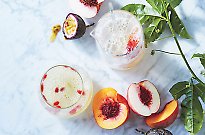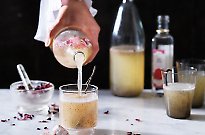
The relationship between food and gut health

Happiness and the gut.
The research trail into how our gut influences our mood deepens with some promising links to staying calm and being happy. In the future, psychobiotics could be used to complement treatment for depression and anxiety. SARAH NANCLARES investigates.
Nutritional psychiatry is an emerging field, researching unique ways for scientists to influence mood and behaviour either by planting brain-altering probiotics in the gut, taking a probiotic or eating foods that ferment in the gut producing chemicals that go on to have impact in our brain. These products are called psychobiotics. While still in its infancy, the human trials so far seem promising.
FROM BOWEL TO BEHAVIOUR
Most of us now know that the microbes in our gut play a much more vital role in our health than previously known. Research has confirmed the ability of our gut flora to communicate with the brain and influence behaviour through a two-way street of communication transmitted via the enteric nervous system, the vagus nerve and the central nervous system. This is known as the gut-brain axis.
When we consider that the most urgent health problems we face globally are mental and emotional health, immunity-based diseases and diet-related diseases, the gut sits among all of them as part of the cause. In the last 15 years, a good deal of research has indicated that certain types of depression can have a link to gut flora imbalances, and therein may lie the cure as well.
The link between high-sugar diets and alterations in gut bacteria has been established in research conducted by Dr Joseph Mercola, who found that microbial changes led to cognitive impairments such as learning difficulties and worsened memory. A study published in PLOS ONE has found that autistic children have distinctly different microbiome compared to children of a similar age. Notably, they tend to have fewer beneficial bacteria such as bifidobacterium.
As a health coach, it is common for me to work with clients who present feeling stressed, anxious and concerned about an aspect of their work and personal life and with that, they often have irritable bowel syndrome (IBS) or ulcerative colitis too. The most positive outcomes occur when we use probiotics alongside our coaching work that supports them to make changes in their lives, key among which are nutrition and rebuilding their gut.
BIRTH AND BENEFICIAL BACTERIA
Amazingly, we establish our original gut flora at birth. A baby gathers its primary microbiota as it travels through the birth canal, scooping it up through its mouth, ears and nose. Through this process, it is believed that the quality and types of microbiota in the mother’s vagina becomes the colonisers for her infant’s intestines. Infants born to mothers with imbalanced vaginal microflora are susceptible to compromised immunity, along with mental and emotional health from birth. Unless healthy gut flora is established in early infancy, a child may go on to experience further health problems in life.
Restoring and re-balancing your gut flora as part of your pre-natal wellness plan can go a long way to giving your unborn child the best mental and emotional start in life. In a 2011 study published in Neurogastroenterology & Motility, it was explained how the gut flora that is established in a newborn baby goes on to define the set point for one of the main stress handling mechanisms in our body known as the hypothalamic-pituitary-adrenal (HPA) axis. Serotonin activates HPA activity and, through this axis, governs how stress impacts digestion, immunity, energy, mood and emotions. Guess where the greatest concentrations of serotonin are found? In our gut.
UNDERSTANDING SEROTONIN
It is also now known that serotonin – a neurochemical chiefly responsible for maintaining a positive mood, among other things – is made in the brain and remarkably, in your gut, too. Although it is a brain chemical, 80 to 90 per cent is actually made in your intestines. Not surprisingly, serotonin also affects your digestion, bowel movements and appetite.
In contrast, dopamine, another happy neurochemical, makes you feel proud and elated when you accomplish and achieve, thus causing a feeling of self-gratification. Signs of serotonin deficiency include depression, sugar cravings, low self-esteem and insomnia.
START A GUT MAKEOVER
Optimising your gut microbiome is like purchasing insurance against disease. It can help normalise your weight and ward off diabetes, and is also a critical component for a well-functioning immune system, which is your primary defence against virtually all disease.
While we previously thought that good health came with a specific profile of gut flora, it has recently been discovered that we each have a uniquely different gut flora profile that constitutes good health.
It really is in your hands, you can wield your personal power to the fullest by correcting your eating habits and implementing some foundational steps. I coach my clients to introduce each of the steps outlined one at a time for one to two weeks. Once that step becomes a habit, build on it by introducing step two and so on until you have habituated them all.
Sarah Nanclares is a business life coach and writer who specialises in working with stress, chronic ill health and nutrition and its impact on leadership, wellbeing and performance.


